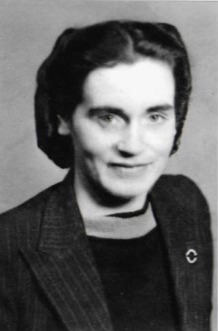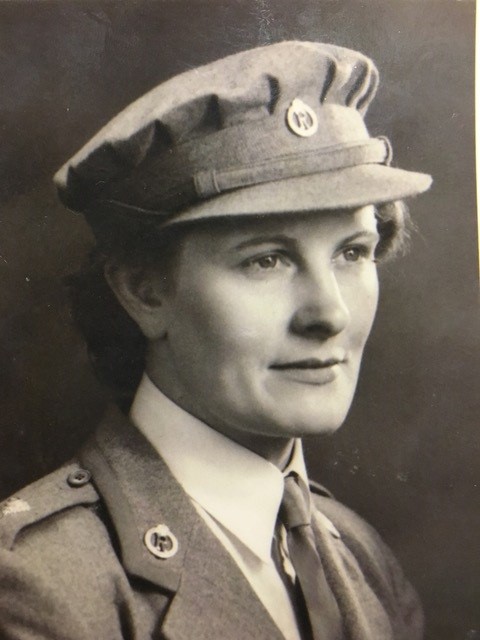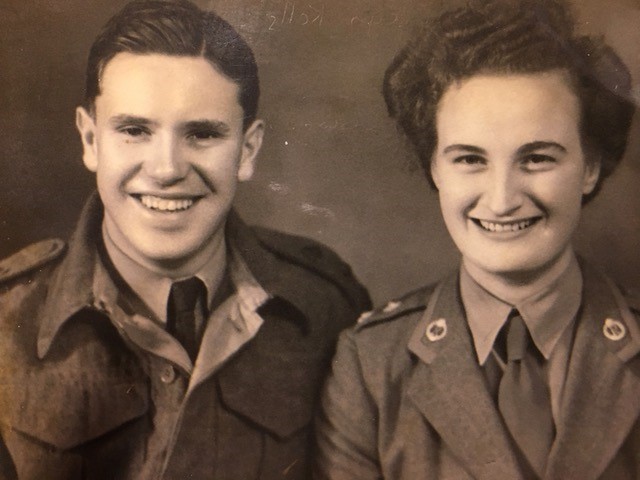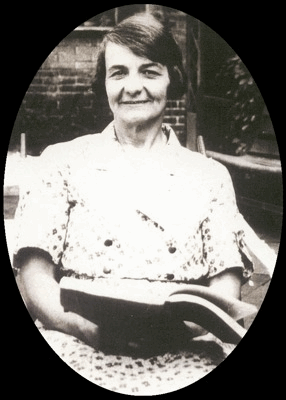This month, we are pleased to share some interesting research by the RCN Northern Ireland History of Nursing Network about Irish nurses during the Second World War. We would like to thank Margaret Graham and members of the RCN Northern Ireland History of Nursing Network for providing us with the research.
The RCN Northern Ireland History of Nursing Network (HoN NI) is an active group of mostly retired nurses who aim to record local nursing history. Since its inception over 25 years ago, the network has been collecting oral histories from nurses willing to share their professional work experience. Collectively, these provide a rich archive of first-hand accounts of nurse training and professional development in Northern Ireland.
Against this background and the many demands on nurses brought about by the 30 years of conflict in Northern Ireland, the network was supported by the RCN in publishing Nurses’ Voices from the Northern Ireland Troubles (2013), a book of narratives written by nurses recalling their experiences of nursing through this traumatic period. This book inspired the BBC documentary, Nurses on the Front Line (2015).
When First World War (1914-1918) commemorations gathered momentum, HoN NI realised the importance of gathering the nursing history of nurses who had volunteered to serve with the armed forces in the Great War. With Heritage Lottery Funding secured, the network published a book, Nurses Voices’ from WW1, the Northern Ireland Connection, in 2018 highlighting the contribution of nurses connected with Northern Ireland who had served on the front line.
Second World War nurses
In 2020, commemorations began to mark the 75th anniversaries of Victory in Europe (VE) Day and Victory over Japan (VJ) Day, marking the end of the Second World War (SWW). The network began to identify nurses from Ireland who had contributed to that war and sought funding to publish a book commemorating their contribution to the war effort, both on the Home Front and overseas battlefronts.
As names and stories were gathered, it became evident that many nurses, mostly women, from across Ireland continued to apply to train in UK hospitals and, when qualified, applied to enlist with the Queen Alexandra’s Imperial Nursing Service Reserve (QAIMNSR) to support the war effort. The research therefore also includes those names gathered from the Republic of Ireland. It was well known that many from across Ireland welcomed the opportunity to train as nurses in Great Britain where hospitals often struggled to reach sufficient staffing levels. What was particularly surprising was the large number who had done so. Thanks to the meticulous research by HoN NI member Seán Graffin, 600 nurses to date have been identified, 400 from the Republic of Ireland.
The information gathered has been both sobering and inspiring as the research unveiled horrific deaths and acts of bravery of the nurses on the Home Front and many battle frontlines.
UK Blitz Attack
 It was sobering to realise that nurses were killed during UK Blitz attack. It must have been a frightening experience for nurses to hear bombs exploding for hours on end, many of which hit hospitals. Over 20 nurses from Ireland North and South were killed during attacks on Manchester, Salford and London. In a very private diary by Mary Morris (Weidenfield & Nicholson 2015) Mary, from Galway, vividly describes the dangers of a London Blitz attack. When qualified, Mary served with the QAs in France.
It was sobering to realise that nurses were killed during UK Blitz attack. It must have been a frightening experience for nurses to hear bombs exploding for hours on end, many of which hit hospitals. Over 20 nurses from Ireland North and South were killed during attacks on Manchester, Salford and London. In a very private diary by Mary Morris (Weidenfield & Nicholson 2015) Mary, from Galway, vividly describes the dangers of a London Blitz attack. When qualified, Mary served with the QAs in France.
QA Reserves Abroad
QA Reserve nurses were deployed to every frontline, working in extremes of temperatures hot and cold, wet and dry, exposed to air raids, poisonous creepy crawlies such as scorpions and infectious disease. Malaria was a particular risk in India and Borneo.
Nurses slept in open trenches, under canvas and, if fortunate, in buildings. Water was frequently rationed, making washing a luxury. During peak battle surges on any front they got little sleep, as hundreds of casualties could arrive enmasse. Theatres were in constant use, amputations, fractures, burns and head injuries were common. Nurses had to work quickly and efficiently to triage the many casualties admitted.
“The bombing grew more intense…. there were two small theatres where abdominal, chest and head injuries were dealt with…no running water, basins filled with disinfectant were used….” (Noral Earls, QA North Africa).
War at Sea
Military hospitals and medical team deployments by troopship to overseas front lines were not without danger as they were exposed to enemy attack. Over 20 nurses died at sea. In Feb 1944, the SS Khedive Ismail was attacked on its way to support the Burma campaign. Nine nurses from Ireland lost their lives, including sisters Margaret and Winifred Kells from County Cavan and Beatrice Dowling from Belfast.


Picured above (L to R): Sisters Margaret Kells and Winifred Kells with unknown male
The Far East

One of the most distressing episodes occurred during the fall of Singapore. Evacuation ships were attacked, killing many, including nurses. Survivors floated on rafts, with few surviving.
Edith Doreen Pedlow and Molly Cooper survived the attack on their ship, the Tajong Penang, leaving Singapore and drifted on a raft for three days.
Pictured above: Sister Ruth Hannah Dickson
The Belfast Telegraph reported:
“On that raft, Edith Doreen Pedlow breathed her last, still wearing her badge as a nurse of the Royal Victoria Hospital, Belfast. Her companion took the badge and pinned it next to her own, that of the Adelaide Hospital, Dublin. The survivors on the raft were captured by the Japanese and interned. In the camp she too died, tended by a third nurse who took the two badges and eventually brought them home to Ireland.” (Belfast Telegraph, Monday, 30 October 1950)
The Adelaide trained nurse was probably Molly Cooper from Carrickmacross, County Monaghan. Both she and Ruth Dickson from Eglish County Tyrone (who survived the attack on the evacuation ship Kuala) died from disease and malnutrition in a Japanese Prisoner of War camp.
D-Day landings
Irish nurses were among the first nurses to land following the D-Day landings and cared for the many casualties as war raged through Northern France until victory in Europe was secured.
However, celebrations were overshadowed as the horrors of the Holocaust unfolded with the discovery of concentration camps. Nurses now had to care for and manage these survivors suffering from malnutrition and disease. An army major remarked how the nurses never flinched. Many nurses were not deployed until after 1946 as there was a massive refugee and displaced population to assist and care for.
These cameos are a snapshot of some of the many fields of war where nurses were deployed. Their presence was recognised as morale boosting for injured troops and they routinely served in frontline casualty clearing stations.
Book launch
The SWW book collated by Margaret Graham was launched last November at an event in Belfast City Hall, which was attended by the Lord Mayor of Belfast, various dignitaries and families who had provided photographs of their serving relatives.
Names of the nurses uncovered by the network have been listed in the final chapter of the book and are presented as a Roll of Honour. A more complete database of information gathered to date by Seán Graffin, including place of birth, training school and service history, has been donated to the Public Records Office of Northern Ireland (PRONI). This list is by no means complete, as many nursing records remain closed for 100 years and may not be available.
Commenting on the project, Rita Devlin, Director of the RCN in Northern Ireland said: "I am delighted that the RCN Northern Ireland History of Nursing Network has undertaken this project and in doing so has gathered so much of our undocumented nursing history. To read that many nurses from across Ireland made such a significant contribution to the Second World War, which is a story largely undiscovered, is of great professional pride. It is harrowing to learn that many died in very tragic circumstances, at sea and as prisoners of war.
"Those who returned to assist with the establishment of the National Health Service brought back many of the skills gained from the battlefront. Like many veterans, these nurses did not speak of their war-time experiences and few left a written record, so their bravery has been largely unrecognised.”
"These nurses worked under extreme conditions such as weather, enemy attack, food shortage and patient influx during heavy battle. Their fortitude and selflessness should be acknowledged and applauded. It is hoped that this publication will in some way shine a light on this overlooked group of nurses who were dedicated to caring for their patients despite the risk to themselves."
The book is available from the RCN NI library, with a suggested donation of £5 to support the RCN Foundation.
Margaret Graham
Chair, RCN Northern Ireland History of Nursing Network